CodeIgniter Date helper
0 3884
Date helper contains functions that help us to work with dates.
Related Topic:

2 mdate(): This function is same as the PHP native function date(). The only difference is that it provides the facility to use MySQL style date codes, where each code letter is preceded with a percent sign, e.g. %Y %m %d. Syntax:
3 standard_date(): This function is used to generate the date string in different standardized formats provided by the user. Some formats supported by this function are:
Syntax:
4 local_to_gmt(): This function is used to convert UNIX timestamp into GMT format. Syntax:
5 gmt_to_local(): This function is used to convert a UNIX timestamp (referenced to GMT) into a localized timestamp based on the timezone and Daylight Saving Time submitted. Syntax:
6 mysql_to_unix(): This function is used to convert MySQL Timestamp into a UNIX timestamp. Syntax:
7 unix_to_human(): This function is used to convert a UNIX timestamp into a human-readable format with the given prototype: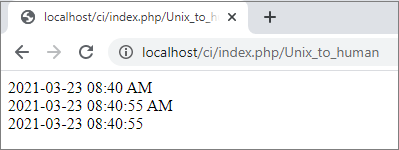
8 human_to_unix(): This function takes human time as input and converts it into a UNIX timestamp. Syntax:
9 nice_date(): This function is used to convert a number of poorly-formed date formats into something useful. Syntax: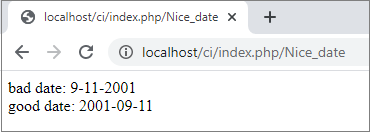
10 timespan(): This function is used to convert a UNIX timestamp into the given format.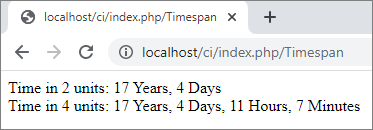
11 days_in_month(): This function is used to returns the number of days in a given month/year. It is also considered a leap year concept. Working of this function is same as PHP native function cal_days_in_month(). Syntax:
12 date_range(): This function is used to get a list of dates within a specified period. Syntax: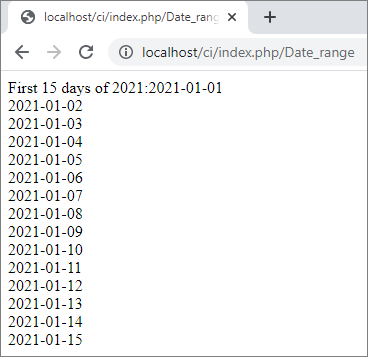
13 timezones(): This function takes a timezone reference as input and returns the number of hours offset from UTC. Syntax:
14 timezone_menu(): This function is used to generates a pull-down menu of timezones. This menu is most commonly used in a membership site in which your users are allowed to set their local timezone value. Syntax:
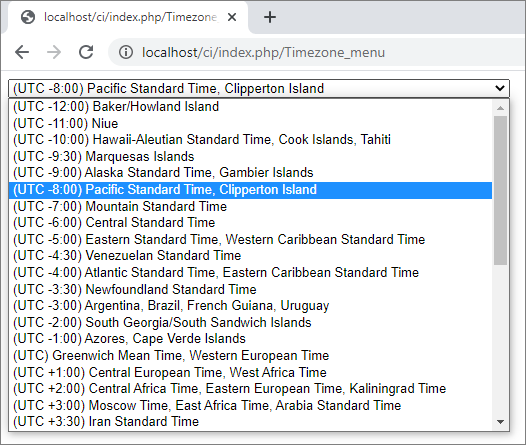
Related Topic:
Codeigniter Interview Questions
Loading this Helper:
Use the given line in your controller or model file to load the Date helper.$this->load->helper('date');
The following functions are available in this helper:
1 now(): This function is used to get the current time referenced either to your server’s local time or any PHP supported timezone. Time reference depends on the "time reference" setting in your application/config/config.php file.
Syntax:now([$timezone = NULL]);Parameter Description:
- $timezone (string) – Timezone
<?phpStep 2 Open the given URL into the browser to see the result.
class Now_controller extends CI_Controller {
public function index() {
$this->load->helper('date'); //load date helper
echo now('Australia/Victoria');
}
}
?>
http://localhost/ci/index.php/Now_controller

2 mdate(): This function is same as the PHP native function date(). The only difference is that it provides the facility to use MySQL style date codes, where each code letter is preceded with a percent sign, e.g. %Y %m %d. Syntax:
mdate([$datestr = ''[, $time = '']]);Parameter Description:
- $datestr (string) – Date string
- $time (int) – UNIX timestamp
<?phpStep 2 Open the given URL into the browser to see the result.
class Mdate_controller extends CI_Controller {
public function index() {
$this->load->helper('date'); //load date helper
$datestring = 'Year: %Y Month: %m Day: %d - %h:%i %a';
$time = time();
echo mdate($datestring, $time);
}
}
?>
http://localhost/ci/index.php/Mdate_controller

3 standard_date(): This function is used to generate the date string in different standardized formats provided by the user. Some formats supported by this function are:
| Constant | Description | Example |
| DATE_ATOM | Atom | 2005-08-15T16:13:03+0000 |
| DATE_COOKIE | HTTP Cookies | Sun, 14 Aug 2005 16:13:03 UTC |
| DATE_ISO8601 | ISO-8601 | 2005-08-14T16:13:03+00:00 |
| DATE_RFC822 | RFC 822 | Sun, 14 Aug 05 16:13:03 UTC |
| DATE_RFC850 | RFC 850 | Sunday, 14-Aug-05 16:13:03 UTC |
| DATE_RFC1036 | RFC 1036 | Sunday, 14-Aug-05 16:13:03 UTC |
| DATE_RFC1123 | RFC 1123 | Sun, 14 Aug 2005 16:13:03 UTC |
| DATE_RFC2822 | RFC 2822 | Sun, 14 Aug 2005 16:13:03 +0000 |
| DATE_RSS | RSS | Sun, 14 Aug 2005 16:13:03 UTC |
| DATE_W3C | W3C | 2005-08-14T16:13:03+0000 |
standard_date([$fmt = 'DATE_RFC822'[, $time = NULL]]);Parameter Description:
- $fmt (string) – Date format
- $time (int) – UNIX timestamp
<?phpStep 2 Open the given URL into the browser to see the result.
class Standard_controller extends CI_Controller {
public function index() {
$this->load->helper('date'); //load date helper
$format = 'DATE_RFC1036';
$time = time();
echo standard_date($format, $time);
}
}
?>
http://localhost/ci/index.php/Standard_controller

4 local_to_gmt(): This function is used to convert UNIX timestamp into GMT format. Syntax:
local_to_gmt([$time = '']);Parameter Description:
- $time (int) – UNIX timestamp
<?phpStep 2 Open the given URL into the browser to see the result.
class Local_to_gmt_controller extends CI_Controller {
public function index() {
$this->load->helper('date'); //load date helper
$gmt = local_to_gmt(time());
echo $gmt;
}
}
?>
http://localhost/ci/index.php/Local_to_gmt_controller

5 gmt_to_local(): This function is used to convert a UNIX timestamp (referenced to GMT) into a localized timestamp based on the timezone and Daylight Saving Time submitted. Syntax:
gmt_to_local([$time = ''[, $timezone = 'UTC'[, $dst = FALSE]]]);Parameter Description:
- $time (int) – UNIX timestamp
- $timezone (string) – Timezone
- $dst (bool) – Whether DST is active
<?phpStep 2 Open the given URL into the browser to see the result.
class Gmt_to_local_controller extends CI_Controller {
public function index() {
$this->load->helper('date'); //load date helper
$timestamp = 1140153693;
$timezone = 'UM8';
$daylight_saving = TRUE;
echo gmt_to_local($timestamp, $timezone, $daylight_saving);
}
}
?>
http://localhost/ci/index.php/Gmt_to_local_controller

6 mysql_to_unix(): This function is used to convert MySQL Timestamp into a UNIX timestamp. Syntax:
mysql_to_unix([$time = '']);Parameter Description:
- $time (string) – MySQL timestamp
<?phpStep 2 Open the given URL into the browser to see the result.
class Mysql_to_unix_controller extends CI_Controller {
public function index() {
$this->load->helper('date'); //load date helper
$unix = mysql_to_unix('20061124092345');
echo $unix;
}
}
?>
http://localhost/ci/index.php/Mysql_to_unix_controller

7 unix_to_human(): This function is used to convert a UNIX timestamp into a human-readable format with the given prototype:
YYYY-MM-DD HH:MM:SS AM/PMSyntax:
unix_to_human([$time = ''[, $seconds = FALSE[, $fmt = 'us']]]);Parameter Description:
- $time (int) – UNIX timestamp
- $seconds (bool) – Whether to show seconds
- $fmt (string) – format (us or euro)
<?phpStep 2 Open the given URL into the browser to see the result.
class Unix_to_human extends CI_Controller {
public function index() {
$this->load->helper('date'); //load date helper
$now = time();
echo unix_to_human($now); // U.S. time, no seconds
echo '<br>'.unix_to_human($now, TRUE, 'us'); // U.S. time with seconds
echo '<br>'.unix_to_human($now, TRUE, 'eu'); // Euro time with seconds
}
}
?>
http://localhost/ci/index.php/Unix_to_human

8 human_to_unix(): This function takes human time as input and converts it into a UNIX timestamp. Syntax:
human_to_unix([$datestr = '']);Parameter Description:
- $datestr (int) – Date string
<?phpStep 2 Open the given URL into the browser to see the result.
class Human_to_unix extends CI_Controller {
public function index() {
$this->load->helper('date'); //load date helper
$now = time();
$human = unix_to_human($now);
$unix = human_to_unix($human);
echo "Human readable date: $human <br>";
echo "UNIX timestamp :$unix";
}
}
?>
http://localhost/ci/index.php/Human_to_unix

9 nice_date(): This function is used to convert a number of poorly-formed date formats into something useful. Syntax:
nice_date([$bad_date = ''[, $format = FALSE]]);Parameter Description:
- $bad_date (int) – The terribly formatted date-like string
- $format (string) – Date format to return (same as PHP’s date() function)
<?phpStep 2 Open the given URL into the browser to see the result.
class Nice_date extends CI_Controller {
public function index() {
$this->load->helper('date'); //load date helper
$bad_date = '9-11-2001';
// Should Produce: 2001-09-11
$better_date = nice_date($bad_date, 'Y-m-d');
echo "bad date: $bad_date <br>";
echo "good date: $better_date";
}
}
?>
http://localhost/ci/index.php/Nice_date

10 timespan(): This function is used to convert a UNIX timestamp into the given format.
1 Year, 10 Months, 2 Weeks, 5 Days, 10 Hours, 16 MinutesSyntax:
timespan([$seconds = 1[, $time = ''[, $units = '']]]);Parameter Description:
- $seconds (int) – Number of seconds
- $time (string) – UNIX timestamp
- $units (int) – Number of time units to display
<?phpStep 2 Open the given URL into the browser to see the result.
class Timespan extends CI_Controller {
public function index() {
$this->load->helper('date'); //load date helper
$post_date = '1079621429';
$now = time();
$units = 2;
echo "Time in 2 units: ".timespan($post_date, $now, $units)."<br>";
$units = 4;
echo "Time in 4 units: ".timespan($post_date, $now, $units);
}
}
?>
http://localhost/ci/index.php/Timespan

11 days_in_month(): This function is used to returns the number of days in a given month/year. It is also considered a leap year concept. Working of this function is same as PHP native function cal_days_in_month(). Syntax:
days_in_month([$month = 0[, $year = '']]);Parameter Description:
- $month (int) – a numeric month
- $year (int) – a numeric year
<?phpStep 2 Open the given URL into the browser to see the result.
class Days_in_month extends CI_Controller {
public function index() {
$this->load->helper('date'); //load date helper
echo days_in_month(06, 2020);
}
}
?>
http://localhost/ci/index.php/Days_in_month

12 date_range(): This function is used to get a list of dates within a specified period. Syntax:
date_range([$unix_start = ''[, $mixed = ''[, $is_unix = TRUE[, $format = 'Y-m-d']]]]);Parameter Description:
- $unix_start (int) – UNIX timestamp of the range start date
- $mixed (int) – UNIX timestamp of the range end date or interval in days
- $is_unix (bool) – set to FALSE if $mixed is not a timestamp
- $format (string) – Output date format, same as in date()
<?phpStep 2 Open the given URL into the browser to see the result.
class Date_range extends CI_Controller {
public function index() {
$this->load->helper('date'); //load date helper
$range = date_range('2021-01-01', '2021-01-15');
echo "First 15 days of 2021:";
foreach ($range as $date)
{
echo $date."<br>";
}
}
}
?>
http://localhost/ci/index.php/Date_range

13 timezones(): This function takes a timezone reference as input and returns the number of hours offset from UTC. Syntax:
timezones([$tz = '']);Parameter Description:
- $tz (string) – A numeric timezone
<?phpStep 2 Open the given URL into the browser to see the result.
class Timezone extends CI_Controller {
public function index() {
$this->load->helper('date'); //load date helper
echo timezones('UM5');
}
}
?>
http://localhost/ci/index.php/Date_range

14 timezone_menu(): This function is used to generates a pull-down menu of timezones. This menu is most commonly used in a membership site in which your users are allowed to set their local timezone value. Syntax:
timezone_menu([$default = 'UTC'[, $class = ''[, $name = 'timezones'[, $attributes = '']]]]);Parameter Description:
- $default (string) – Timezone
- $class (string) – Class name
- $name (string) – Menu name
- $attributes (mixed) – HTML attributes
<?phpStep 2 Open the given URL into the browser to see the result.
class Timezone_menu extends CI_Controller {
public function index() {
$this->load->helper('date'); //load date helper
echo timezone_menu('UM8');
}
}
?>
http://localhost/ci/index.php/Timezone_menu


Timezone Reference:
Different timezones and their locations are listed below:| Time Zone | Location |
| UM12 | (UTC - 12:00) Baker/Howland Island |
| UM11 | (UTC - 11:00) Samoa Time Zone, Niue |
| UM10 | (UTC - 10:00) Hawaii-Aleutian Standard Time, Cook Islands |
| UM95 | (UTC - 09:30) Marquesas Islands |
| UM9 | (UTC - 09:00) Alaska Standard Time, Gambier Islands |
| UM8 | (UTC - 08:00) Pacific Standard Time, Clipperton Island |
| UM7 | (UTC - 07:00) Mountain Standard Time |
| UM6 | (UTC - 06:00) Central Standard Time |
| UM5 | (UTC - 05:00) Eastern Standard Time, Western Caribbean |
| UM45 | (UTC - 04:30) Venezuelan Standard Time |
| UM4 | (UTC - 04:00) Atlantic Standard Time, Eastern Caribbean |
| UM35 | (UTC - 03:30) Newfoundland Standard Time |
| UM3 | (UTC - 03:00) Argentina, Brazil, French Guiana, Uruguay |
| UM2 | (UTC - 02:00) South Georgia/South Sandwich Islands |
| UM1 | (UTC -1:00) Azores, Cape Verde Islands |
| UTC | (UTC) Greenwich Mean Time, Western European Time |
| UP1 | (UTC +1:00) Central European Time, West Africa Time |
| UP2 | (UTC +2:00) Central Africa Time, Eastern European Time |
| UP3 | (UTC +3:00) Moscow Time, East Africa Time |
| UP35 | (UTC +3:30) Iran Standard Time |
| UP4 | (UTC +4:00) Azerbaijan Standard Time, Samara Time |
| UP45 | (UTC +4:30) Afghanistan |
| UP5 | (UTC +5:00) Pakistan Standard Time, Yekaterinburg Time |
| UP55 | (UTC +5:30) Indian Standard Time, Sri Lanka Time |
| UP575 | (UTC +5:45) Nepal Time |
| UP6 | (UTC +6:00) Bangladesh Standard Time, Bhutan Time, Omsk Time |
| UP65 | (UTC +6:30) Cocos Islands, Myanmar |
| UP7 | (UTC +7:00) Krasnoyarsk Time, Cambodia, Laos, Thailand, Vietnam |
| UP8 | (UTC +8:00) Australian Western Standard Time, Beijing Time |
| UP875 | (UTC +8:45) Australian Central Western Standard Time |
| UP9 | (UTC +9:00) Japan Standard Time, Korea Standard Time, Yakutsk |
| UP95 | (UTC +9:30) Australian Central Standard Time |
| UP10 | (UTC +10:00) Australian Eastern Standard Time, Vladivostok Time |
| UP105 | (UTC +10:30) Lord Howe Island |
| UP11 | (UTC +11:00) Srednekolymsk Time, Solomon Islands, Vanuatu |
| UP115 | (UTC +11:30) Norfolk Island |
| UP12 | (UTC +12:00) Fiji, Gilbert Islands, Kamchatka, New Zealand |
| UP1275 | (UTC +12:45) Chatham Islands Standard Time |
| UP13 | (UTC +13:00) Phoenix Islands Time, Tonga |
| UP14 | (UTC +14:00) Line Islands |

Share:








Comments
Waiting for your comments